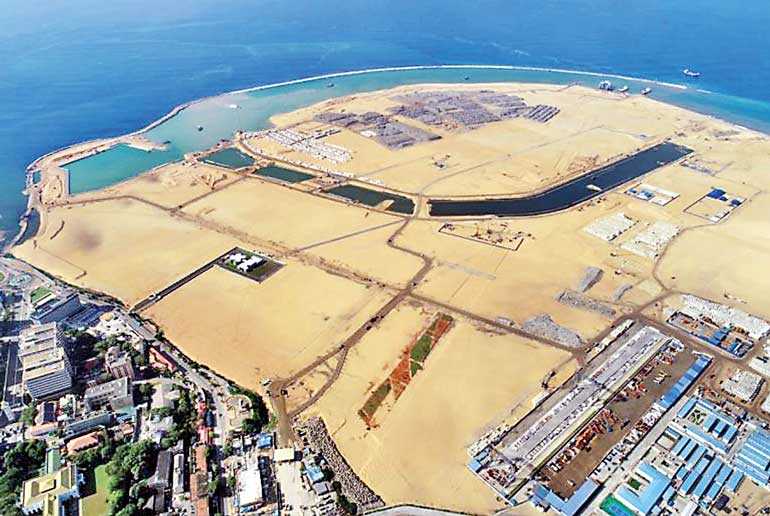Wednesday Feb 18, 2026
Wednesday Feb 18, 2026
Monday, 2 September 2019 01:45 - - {{hitsCtrl.values.hits}}

AG’s final observations received by Govt.
Steering Committee to decide on final structure, contours of law in two weeks
PM to subsequently present draft to Cabinet
Proposed law to provide frameworks for regulation of foreign investment, financial institutions within CIFC
The draft of the special law that is to govern the Colombo International Financial Centre, which is part of the $1.5 billion Port City project, will be submitted to Cabinet this month, a top official said yesterday.
The compilation of the regulations has been in the works for some time, and the Government has received the final observations from the Attorney General’s Department on the special law, Non-Cabinet Minister of Economic Reforms and Public Distribution Dr. Harsha de Silva told the Daily FT.
According to Dr. de Silva, a Steering Committee will decide on the final structure and contours of the law in the coming days, prior to Prime Minister Ranil Wickremesinghe presenting the draft legislation to Cabinet before the end of September.
“The AG’s Depart-ment has sent in their final observations, hopefully in the coming two weeks, the Steering Committee will agree on a final draft and the contours of the law. Once the Steering Committee is in agreement, the Prime Minister will bring it to the Cabinet,” Dr. de Silva said.
The move comes in the wake of the Colombo Port City being established as an ‘urban development area’ under the Urban Development Authority (UDA) by the Megapolis and Western Development Ministry last month, thus bringing all development activities in the Port City land under the purview of regulations and supervision of the UDA.
The proposed draft Bill, which will provide the legislation to regulate the Colombo International Financial City (CIFC), formerly named the Colombo Port City, will cover the jurisdiction of the new territory, and include regulatory frameworks for foreign investment and the function of financial institutions within the CIFC.
The CIFC is to include a special International Financial Zone (IFZ), aimed at making foreign investment less complicated.
However, a Constitutional law expert had earlier warned that the draft Bill may lead to some Constitutional amendments, which may be opposed in Parliament. However, Dr. de Silva did not comment on whether a Constitutional amendment would be necessary, saying that the issue would be discussed by the Steering Committee.
States like China, Singapore, and Dubai have made changes to their legal systems in the past, when establishing special financial cities. The CIFC is the first time Sri Lanka is attempting to draw special legislation to govern an artificially-developed area as a financial city.
The Government hopes that investment into the CIFC would put Sri Lanka on the global financial services map, and enable Sri Lanka to reach the envisioned ‘South Asian Hub’ status.
The CIFC is a concept jointly developed by the Government and Chinese multinational corporate China Harbour Engineering Company (CHEC), which is a subsidiary of Port City Colombo’s parent company China Communications Construction Company Limited (CCCC).
In December 2017, Cabinet approved a proposal to sign a Memorandum of Understanding (MOU) with CHEC Port City Colombo, to develop the Colombo International Financial City building complex, valued at $ 1 billion, on Sri Lanka’s artificial island. According to the Megapolis Ministry, the building complex will be located on 6.8 Ha of land, and entail a FDI of approximately $ 400 million in Phase I, and a further $ 600 million in Phase II. Skidmore Owings & Merrill (SOM) of the US has already been awarded the design contract of the building, after being selected as the winner of a global competition to design the master plan for the development.